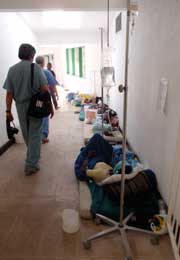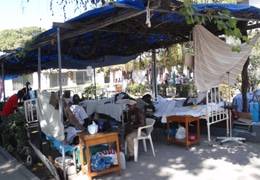Notes on Haiti - CEO Journal Part 7

Note: While serving a medical mission to Haiti, Scripps CEO Chris Van Gorder is writing dispatches about medical aid in progress, conditions on the ground and what can be done to help earthquake victims. For other journal entries, see the Haiti news page.
This morning, Dr. Brent Eastman’s team of six physicians and nurses went to the Hospital Saint Francois de Sales and met their five counterparts from the University of Maryland. The physician leaders met and worked out a coordinated plan for the day. The University of Maryland has been involved in Haiti for years, mostly working with HIV/AIDS patients. Several members of their team went into the tent camps during the day and identified several patients with fractures and other injuries caused by the earthquake who had not yet received treatment.
Our team also made rounds within the hospital, so we already have 15 cases scheduled for tomorrow — and that’s before the walk-ins who are sure to fill the triage area.

I’m told we had a couple of issues during the day. First, the Haitian nurses were feeling left out of this recovery effort. They always seemed to be standing back and appeared to not to want to get too involved with us and the surgical cases we had been assigned or identified. Apparently, though, that was a false assumption. So this afternoon, Dr. Eastman met with them and, through an interpreter, worked the situation out — diplomat that he is. From now on, the Haitian nurses will be an active part of the care teams — a cultural learning for all of us.
The second issue related to my team coming into Haiti. We had a schedule glitch and arrived one hour sooner than expected, so no pick-up of supplies, nor did we have a ride to the hospital. Fortunately, we were able to connect by e-mail and a small pick-up truck was dispatched to get us. The Air Force and TSA staff running the airport were very cooperative and told us our driver would be given access to the airport tarmac when he arrived. The airport was very busy today — much busier than when we arrived last week. Then again, when Brent and I arrived last time, it was 2:30 a.m.
Anyway, the pick-up finally arrived and that’s when we ran into another problem. The truck was not big enough to take five adults with bags and the 14 boxes and bags of supplies we had brought along. So we decided to temporarily split the team. Deb McQuillen and I went with our driver to deliver the supplies — first to the hospital and then up to the Nuncio’s compound where we could later sort, organize and prepare to work full time on patients. Meanwhile, Kelly Hardiman and Rob Sills were good sports and stayed at the airport with our precious supplies for several hours before we could get back to them.
Rob will have a new job tomorrow. We only have one sterilizer at the hospital, so instruments have been getting cleaned and sterilized at too slow a pace. So tomorrow, Rob will take that on — most likely supported by me.
The environment is changing here in Port-au-Prince — major changes in just the few days we were gone. Traffic is picking up; I saw the first heavy equipment removing debris from streets and some badly damaged areas. Law enforcement, U.N. and military presence has picked up significantly. While we were at the airport, a United Airlines passenger jet came in and picked up many people who had been waiting for transportation off the island. That appeared to startle some people. Kelly and I were approached by one Haitian man who asked us in a very agitated way: “Why are all the American citizens leaving? Is there something you’re not telling us? Why are you all trying to get out of here?” Kelly just spoke briefly to him and he calmed down and walked away.
Our guide today pointed out at least a half-dozen schools that were totally destroyed by the earthquake. It still is not clear to us why so many schools here on Haiti collapsed. Our driver pointed out one school where he said 500 school children were killed. He said none survived.
Tonight, our complete team had dinner together for the first time. We had dinner with the Nuncio at 7:30 p.m. Tomorrow, I’m told there will be a BBQ for us — but we will be paying for it (and I’m happy about that). And we have identified an American man who will provide transportation for our team during the week. He has lived on Haiti for 22 years and runs a few schools. Fortunately, none of his schools were badly damaged. One of his schools is a boarding school and several of the older students will be working as interpreters for our team.
In discussion before dinner, Dr. Eastman told the group about a woman with some bad wound infections on her legs. When Brent asked her how she was feeling, she explained she had no pain from the wounds, but that she was scared. Brent asked her what she was scared about. “I’m scared about what’s going to happen to me," she said. This woman, very bright and in her mid-20s, has lost everything. She no longer has a home to go back to, even if she does get physically better. One does start to wonder what will happen to all of these patients after we leave.
So, we have arrived. One half of the team did several surgical cases today — mostly dealing with old wounds and secondary issues from initial traumas. Tomorrow, our full team will go to work at 6 a.m. and we will try to bring our World of Healing to a few patients who truly need our care and compassion.
Thanks again to each of you at home for your support. I’ll talk to you again tomorrow.
Chris Van Gorder
See the Haiti news page for other journal entries.